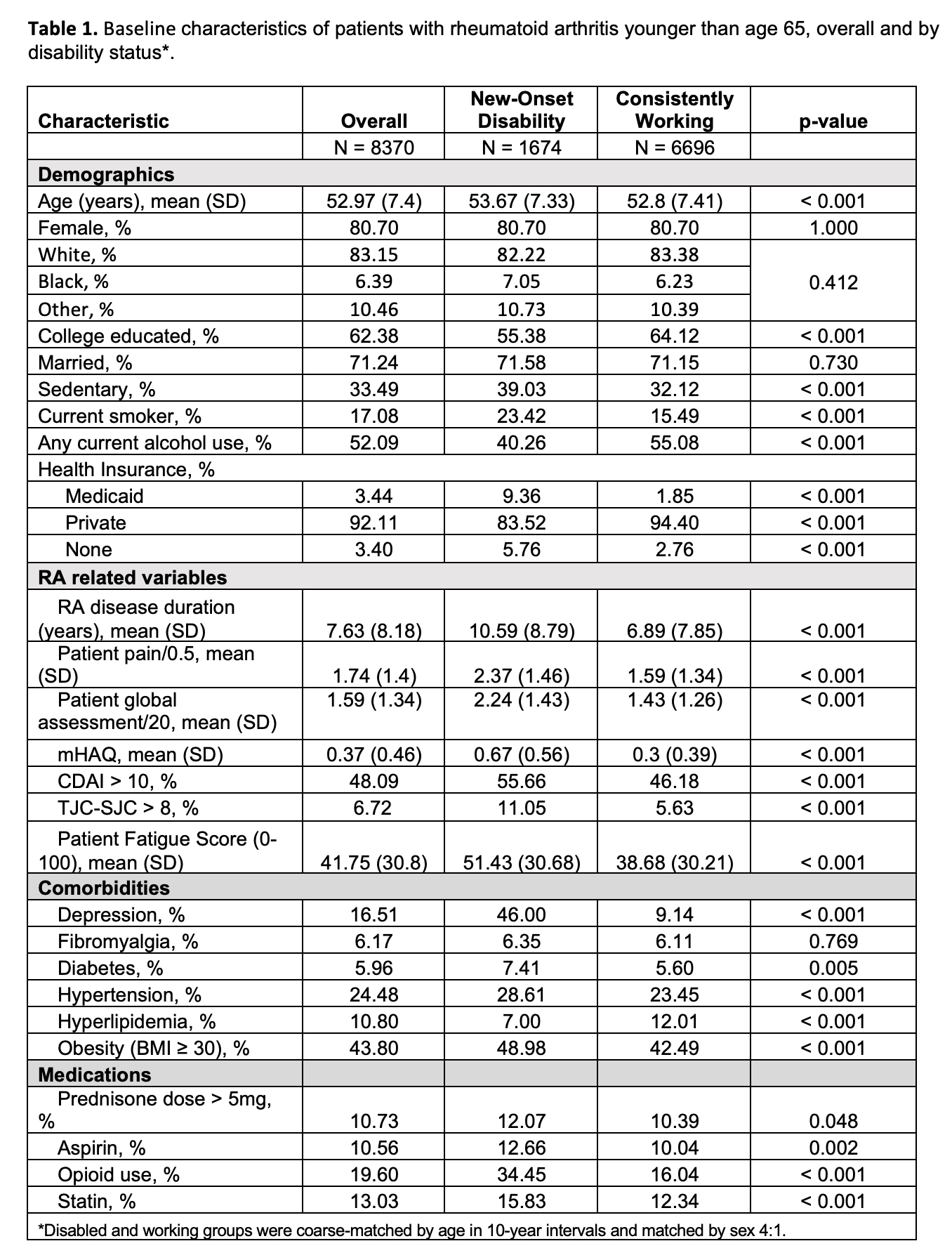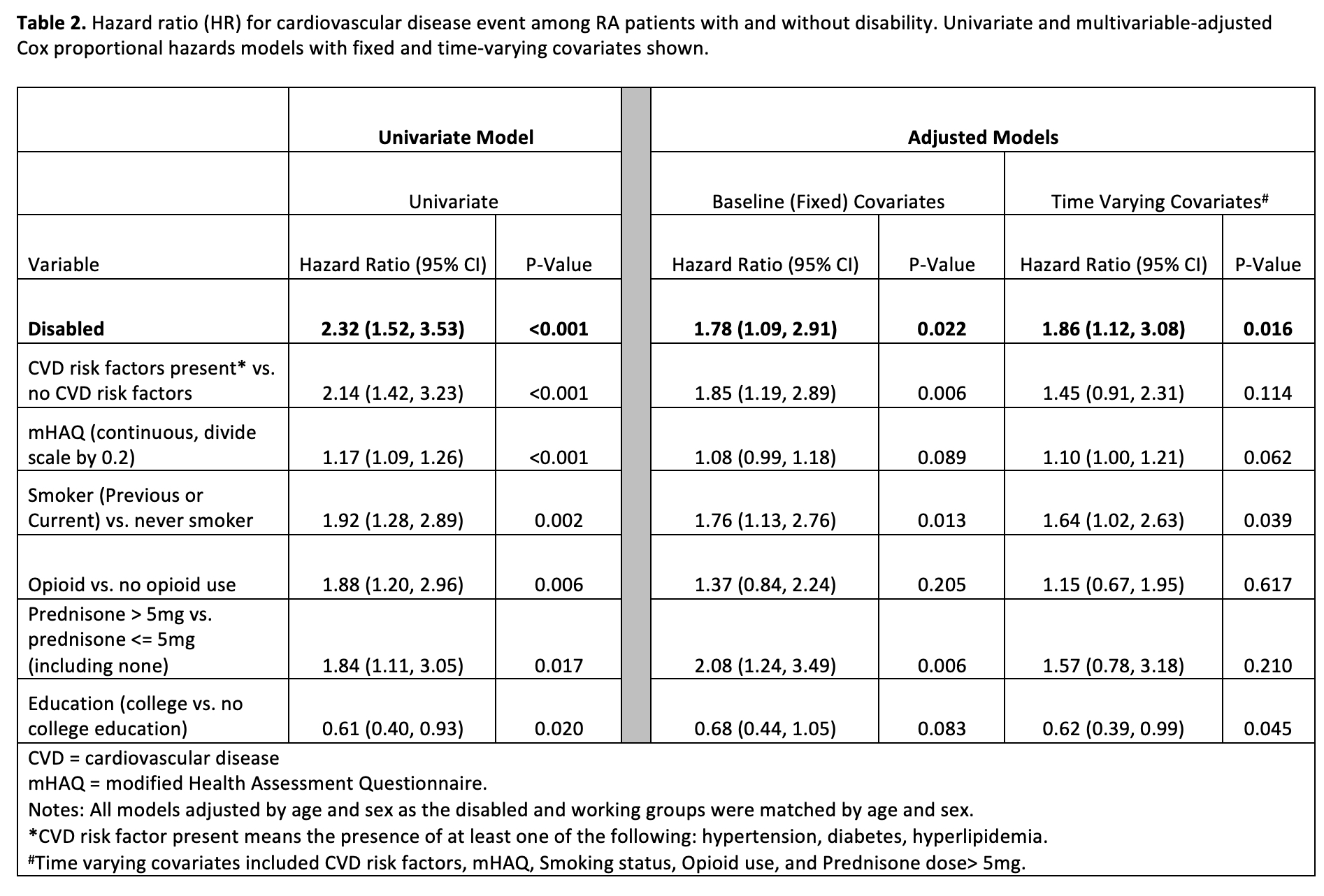Session Information
Date: Tuesday, November 14, 2023
Title: (2095–2140) RA – Diagnosis, Manifestations, and Outcomes Poster III
Session Type: Poster Session C
Session Time: 9:00AM-11:00AM
Background/Purpose: Cardiovascular disease (CVD) is the most common cause of death among patients with RA. Prior research found a higher rate of CVD events associated with disability among patients with RA. There is insufficient data however on disease activity and duration in this population, and the impact of new-onset disability is unknown. We need to understand these factors to develop sufficient preventive measures for patients with RA and disability. We hypothesize that among patients with RA younger than 65 years of age, new-onset disability is associated with a higher risk for CVD, and the primary contributing factors include traditional risk factors, disease characteristics, and medications.
Methods: This retrospective cohort study using the CorEvitas RA registry included patients age < 65 years who were working as of registry enrollment and had no history of CVD (MI, CAD, CVA, TIA, or PAD). The exposure was new-onset disability defined as a change from working to disabled while < 65 years or to retired while < 60 years. The comparator group was patients consistently working who were age- and sex-matched in a 4:1 ratio to the newly disabled. Demographics, comorbidities, RA-specific variables, and medications at baseline (time of onset of disability or enrollment for matched controls) were analyzed using descriptive statistics. Incidence rates of CVD for each group were calculated using Poisson regression. We built sequential Cox proportional hazards models with age as the time axis to identify the factors that best explained the excess CVD risk associated with disability among patients with RA. We selected covariates based on the association with CV risk or new-onset disability in the univariate analysis.One set of models used all factors at baseline; a second set allowed for time-varying covariates.
Results: 8370 patients were included (1674 in the disabled group and 6696 in the working group) with an overall mean age of 53 years and 80.7% female (Table 1). Mean follow-up was 10 years. Almost half (46%) of the disabled group reported depression compared to 9.14% in the working group (p < 0.001). The age and sex-adjusted incidence rate of CV events was 5.40 (95% CI 3.88, 7.52) events per 1000 person-years in the disabled group and 2.17 (95% CI 1.68, 2.80) in the non-disabled group (p < 0.001). The hazard ratio (HR) for CVD associated with disability was 2.32 (95% CI 1.52, 3.53) in the age- and sex-adjusted model, 1.78 (95% CI 1.09, 2.91) in the fixed covariate model, and 1.86 (95% CI 1.12, 3.08) in the time-varying model (Table 2). No model fully explained the excess risk for CVD in the disabled population as a significant association persisted despite multivariate adjustment.
Conclusion: Patients younger than 65 with RA who experience new-onset disability are at significantly higher risk for CVD compared to age- and sex-matched non-disabled patients with RA. This excess risk is partially explained by traditional risk factors, reduced physical function, and medications, but much of the risk remains unexplained. This is likely due to unmeasured variables, such as social determinants of health and related health behaviors. We thus need to examine how a holistic approach in patient care may mitigate this excess CVD risk in RA patients with disability.
To cite this abstract in AMA style:
Spandorfer R, Kane K, Reed G, Pappas D, Kremer J, Curtis J, Navarro-Millán I. New Onset Disability in Rheumatoid Arthritis Is an Underrecognized Cardiovascular Risk Factor: A Retrospective Cohort Study Using the CorEvitas Registry [abstract]. Arthritis Rheumatol. 2023; 75 (suppl 9). https://acrabstracts.org/abstract/new-onset-disability-in-rheumatoid-arthritis-is-an-underrecognized-cardiovascular-risk-factor-a-retrospective-cohort-study-using-the-corevitas-registry/. Accessed .« Back to ACR Convergence 2023
ACR Meeting Abstracts - https://acrabstracts.org/abstract/new-onset-disability-in-rheumatoid-arthritis-is-an-underrecognized-cardiovascular-risk-factor-a-retrospective-cohort-study-using-the-corevitas-registry/


